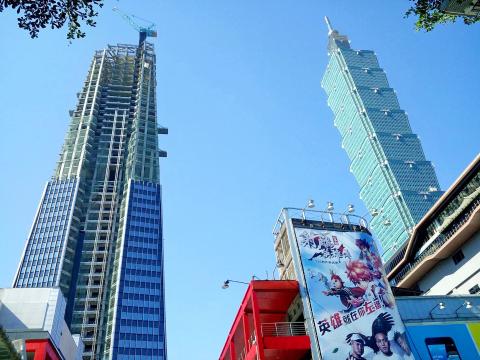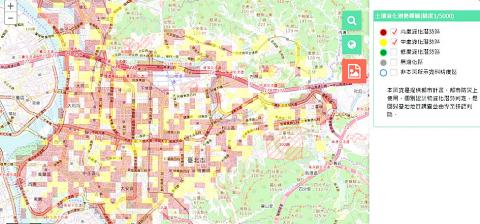The Taipei City Government yesterday unveiled a map showing areas in the city prone to soil liquefaction, with 26.1 percent of the city having intermediate to high-level soil liquefaction potential.
Soil liquefaction is a geological phenomenon that occurs when shaking during an earthquake causes saturated granular material to behave like a liquid, potentially causing soil to be unable to support structures above it.
Soil liquefaction has become a prominent issue, as it is believed to have contributed to the collapse of the Weiguan Jinlong complex in Tainan that killed 115 people when a magnitude 6.4 earthquake hit the city on Feb. 6.

Photo: Hsu Yi-ping, Taipei Times
The city government map showed that 17.4 percent of Taipei is highly prone to soil liquefaction, while 8.7 percent and 1.5 percent of the city face intermediate and low risks of liquefaction respectively.
The Taipei Department of Public Works said 54.4 percent of the municipality is in mountainous areas, which are not at risk of liquefaction, while another 3.5 percent of land has not displayed any potential for liquefaction.
Liquefaction potential of 14.5 percent of the city could not be determined due to insufficient data.

Photo: Huang Chien-hao, Taipei Times
Notable landmarks that were identified by the map as in areas showing a high probability of soil liquefaction include Taipei 101 and the Taipei City Hall.
Taipei Mayor Ko Wen-je’s (柯文哲) home on Xinyi Road was also found to be in an area showing a high risk of soil liquefaction.
In response to reporters’ questions about whether he was concerned about his home being vulnerable to earthquakes, Ko said he was not, as it was built after the 921 Earthquake in 1999.
He said that construction regulations introduced after the 921 Earthquake mandate sufficient seismic engineering work be carried out on new buildings.
He called on residents whose homes are deemed vulnerable to earthquakes to file a request with the city government to be part of the city’s urban renewal projects.
The department urged people not to panic if their homes are found to be in areas susceptible to liquefaction, as they might be eligible for an “old building health check” performed by the city’s Construction Management Office and receive subsidies if urban renewal efforts are deemed necessary for their homes.
Compared with the Executive Yuan’s query system for soil liquefaction potential, the map features a larger scale and is five times more accurate, the department said.
Residents can find out about the risk of soil liquefaction in their neighborhoods by entering their addresses on the city’s soil liquefaction query system: http://soil2.taipei/gismap.html.

SECURITY: As China is ‘reshaping’ Hong Kong’s population, Taiwan must raise the eligibility threshold for applications from Hong Kongers, Chiu Chui-cheng said When Hong Kong and Macau citizens apply for residency in Taiwan, it would be under a new category that includes a “national security observation period,” Mainland Affairs Council (MAC) Minister Chiu Chui-cheng (邱垂正) said yesterday. President William Lai (賴清德) on March 13 announced 17 strategies to counter China’s aggression toward Taiwan, including incorporating national security considerations into the review process for residency applications from Hong Kong and Macau citizens. The situation in Hong Kong is constantly changing, Chiu said to media yesterday on the sidelines of the Taipei Technology Run hosted by the Taipei Neihu Technology Park Development Association. With

CARROT AND STICK: While unrelenting in its military threats, China attracted nearly 40,000 Taiwanese to over 400 business events last year Nearly 40,000 Taiwanese last year joined industry events in China, such as conferences and trade fairs, supported by the Chinese government, a study showed yesterday, as Beijing ramps up a charm offensive toward Taipei alongside military pressure. China has long taken a carrot-and-stick approach to Taiwan, threatening it with the prospect of military action while reaching out to those it believes are amenable to Beijing’s point of view. Taiwanese security officials are wary of what they see as Beijing’s influence campaigns to sway public opinion after Taipei and Beijing gradually resumed travel links halted by the COVID-19 pandemic, but the scale of

A US Marine Corps regiment equipped with Naval Strike Missiles (NSM) is set to participate in the upcoming Balikatan 25 exercise in the Luzon Strait, marking the system’s first-ever deployment in the Philippines. US and Philippine officials have separately confirmed that the Navy Marine Expeditionary Ship Interdiction System (NMESIS) — the mobile launch platform for the Naval Strike Missile — would take part in the joint exercise. The missiles are being deployed to “a strategic first island chain chokepoint” in the waters between Taiwan proper and the Philippines, US-based Naval News reported. “The Luzon Strait and Bashi Channel represent a critical access

Pope Francis is be laid to rest on Saturday after lying in state for three days in St Peter’s Basilica, where the faithful are expected to flock to pay their respects to history’s first Latin American pontiff. The cardinals met yesterday in the Vatican’s synod hall to chart the next steps before a conclave begins to choose Francis’ successor, as condolences poured in from around the world. According to current norms, the conclave must begin between May 5 and 10. The cardinals set the funeral for Saturday at 10am in St Peter’s Square, to be celebrated by the dean of the College